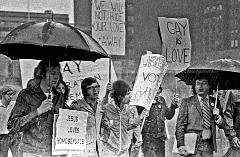 This year marks the 50th anniversary of Canada’s first gay and lesbian rights demonstration. The protest, which has come to be known as “We Demand”, took place in Ottawa on August 28, 1971 in conjunction with a parallel protest in Vancouver. It has been reported that as many as 200 gays and lesbians marched together to the steps of Parliament Hill to deliver a manifesto. The gathering included a coalition of gay activists and organizations, including Toronto Action, the Community Homophile Association of Toronto, and Montreal’s Front de Liberation Homosexual.
This year marks the 50th anniversary of Canada’s first gay and lesbian rights demonstration. The protest, which has come to be known as “We Demand”, took place in Ottawa on August 28, 1971 in conjunction with a parallel protest in Vancouver. It has been reported that as many as 200 gays and lesbians marched together to the steps of Parliament Hill to deliver a manifesto. The gathering included a coalition of gay activists and organizations, including Toronto Action, the Community Homophile Association of Toronto, and Montreal’s Front de Liberation Homosexual.
Although the protesters had planned the demonstration well in advance, they would not have known that it would be a day of rain and cold. But the protesters were not daunted, some having travelled by bus and car from Toronto, Montreal, Kitchener, Waterloo and Kingston. Jearld Moldenhauer, who would found the Body Politic the next year, photographed We Demand and it received some media coverage.
A key message at the event was the call for equality and respect, for freedom from having to hide for fear of criminal, employment and other persecution and oppression.
The name “We Demand” referenced the document that was read out at the protest calling for changes to discriminatory federal laws and policies. This national strategy for change included calls for further amendments to the Criminal Code to remove clauses used to harass and police gay communities and relationships, protection against discrimination in employment, changes to immigration policies that had been barring “homosexuals” since 1952, demands to end both RCMP surveillance of gays and lesbians in the public service and federal practices of purging LGBTQ peoples from the civil service, and freedom to lesbians, gays and bisexuals to serve in the military.
Up until 2 years before We Demand, Canada’s Criminal Code treated a gay person who might engage in same-sex sex to be a “dangerous sexual offender.” It was an era of brutal police action targeting LGBTQ+ people and communities, including swarming gay bathhouses to arrest gay men or arresting lesbians like the Brunswick Four brave enough to celebrate their sexual orientation. It was a time when, although Ontario’s Human Rights Code was under review for a range of changes, efforts to include sexual orientation as a protected ground received broad and strident rebuke, meaning that there was not legal protection against LGBTQ+-based discrimination in the very basic social areas of housing, employment, and services.
Gay and lesbian rights groups were just newly appearing on the Canadian scene and finding their advocacy feet: examples beyond those represented at We Demand were Gay Alliance Towards Equality founded in Edmonton in 1971, Calgary’s People’s Liberation founded in 1973, the Womyn’s Collective founded in 1977, and the Vancouver Gay Liberation Front in Vancouver. Gay publications and bookstores were on the horizon but not yet generally established.
We Demand was also 24 years before Canada’s Supreme Court treated sexual orientation as a protected ground under Canada’s Charter of Rights and Freedoms. It was 25 years before any provincial jurisdiction in Canada would allow same-sex couples to adopt. It was also 25 years before sexual orientation was added to Canada’s Human Rights Act and 46 years before that same Act would be amended to include gender identity. It was 32 years before gay marriage would be legal in Canada. It was 46 years before the 2017 apology that Canada’s Prime Minister would deliver for the oppression of Canadian Lesbian, Gay, Bisexual, Transgender, Queer and Two-spirit communities and thank the trailblazers who fought for LGBTQ+ rights in We Demand and beyond. It was 49 years before the Canadian Association of Chiefs of Police would acknowledge and apologize for police contribution to institutional bias, intolerance and human rights violations of Two-spirit, Lesbian, Gay, Bisexual, Trans, Transgender and Queer communities and to state a commitment against homophobia and transphobia.
Ultimately, in an inhospitable, often hateful, often brutal social and political environment, extremely brave people gathered 50 years ago to come out, to stand up and to fight for rights that would be a long time coming, rights which many in LGBTQ+ communities currently enjoy but which still feel elusive to so many others and which remain persistently under threat.
We Demand is memorialized by a mural at the corner of Bank and Gilmour Streets in downtown Ottawa and Capital Pride, Ottawa’s LGBTQ+ pride festival, is typically scheduled around the anniversary of We Demand.
For information on the protest, see:
Levy, Ron. "We Demand". The Canadian Encyclopedia, 21 August 2020, Historica Canada. https://www.thecanadianencyclopedia.ca/en/article/we-demand.
https://digitalexhibitions.arquives.ca/exhibits/show/1971-we-demand-march/introduction
https://www.villagelegacy.ca/items/show/8?tour=1&index=44
https://www.cbc.ca/archives/entry/the-first-gay-march
Special thanks to Sheilagh Turkington for her assistance in preparing this feature.
About this feature: The Cavalluzzo LLP features series, Reflections: Labour, Human and Civil Rights, highlights some of the leaders, events, and milestones that are historical underpinnings to the current landscape of Canadian human rights and labour rights. Reflections may reference abhorrent historical realities: as we bear witness to those, we also recognize with gratitude the courage and commitment of the changemakers who continue to inspire strides in social justice. Each instalment in this series has been authored or contributed to by Cavalluzzo LLP staff, articling students or lawyers.